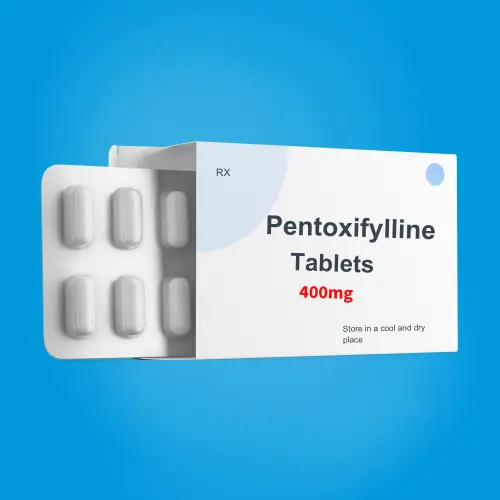Description
Introduction to Pentoxifylline Tablets
Uses of Medicine: Pentoxifylline tablets 400 mg belongs to a group of medicines known as xanthine derivatives or hemorrheologic agents. Patients, Healthcare Professionals, or Hospitals can buy Pentoxifylline 400 mg Tablets online from India through Indian Generic Medicines (a trusted Pentoxifylline Supplier, Exporter, and Contract Manufacturer in India) for the management and treatment of:
- Peripheral arterial disease (PAD)
- Chronic venous insufficiency (CVI)
- Vascular dementia
- Sickle cell disease
- Alcoholic hepatitis
- Raynaud’s phenomenon
- Impaired wound healing
Pentoxifylline 400 mg is designed to work by improving blood flow in the body. This is performed by reducing the thickness (viscosity) of the blood and making red blood cells (RBCs) more flexible. This drug is particularly used for treating a condition known as Peripheral Arterial Disease (PAD). In PAD, the blood flow to the limbs—usually the legs—is reduced because of narrowed arteries. This causes pain and cramping during walking or exercise, a symptom known as intermittent claudication. This therapeutic drug helps ease these signs and symptoms by improving circulation.
Apart from PAD, the Pentoxifylline 400 mg tablet is also effective in treating chronic venous insufficiency. This is a condition where blood does not flow appropriately back to the heart from the legs. This can be responsible for causing swelling, pain, or changes to the skin. The medicine also supports the healing of certain skin conditions developed due to poor blood flow. Improving the circulation helps the body repair tissues and relieve discomfort. Always take this medicinal product as directed by your healthcare provider (HCP), and do not change the dose without consulting a medical professional.
Some individuals should avoid taking Pentoxifylline 400 mg. If you are allergic to it or any ingredient in the tablet, just avoid it. Individuals with bleeding disorders, a known history of stroke, or recent major surgery should also not take this medicine. The medicine is not safe for individuals with recent bleeding in the brain or eyes. Before taking the tablet, let your doctor know in case you have kidney complications or if you are using therapeutic drugs that affect the kidneys or increase the risk of bleeding.
This medicinal product is not recommended for children. Its effects have not been completely studied in young patients. The elderly should use it under proper supervision, as they may require dose adjustments. It is important to follow your clinician’s instructions and inform them about all current medicinal products and health complications before starting treatment with Pentoxifylline 400 mg tablets.






